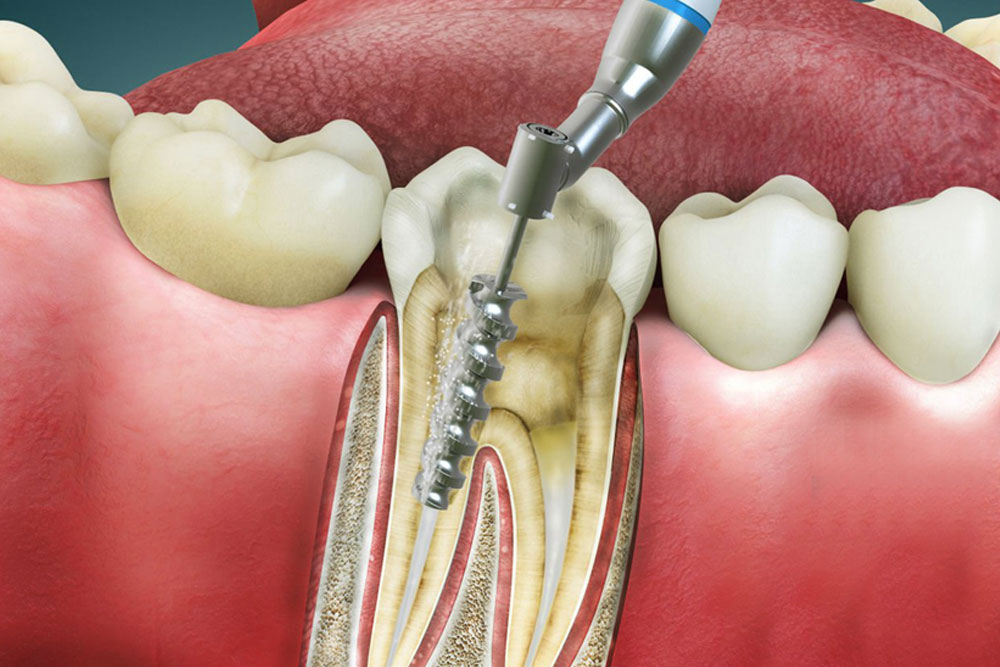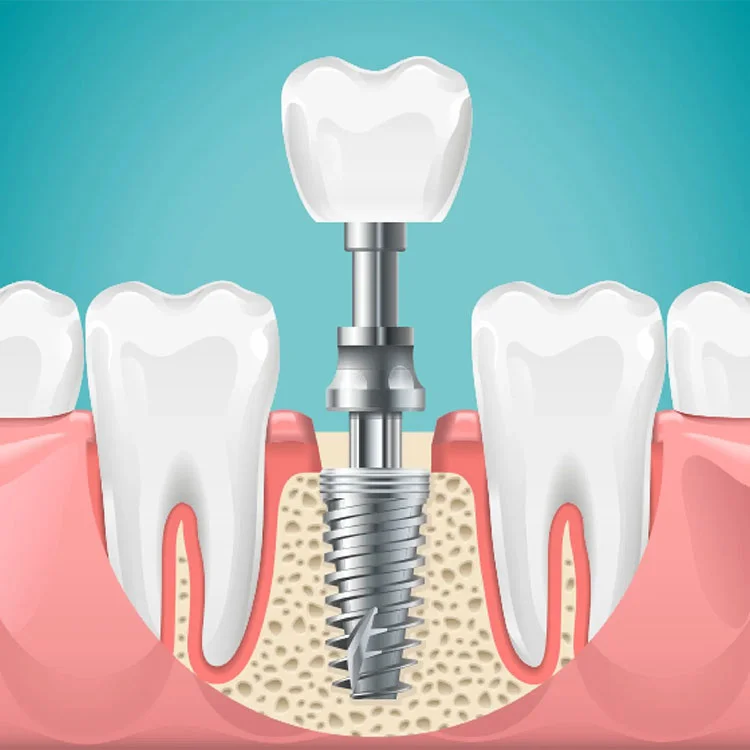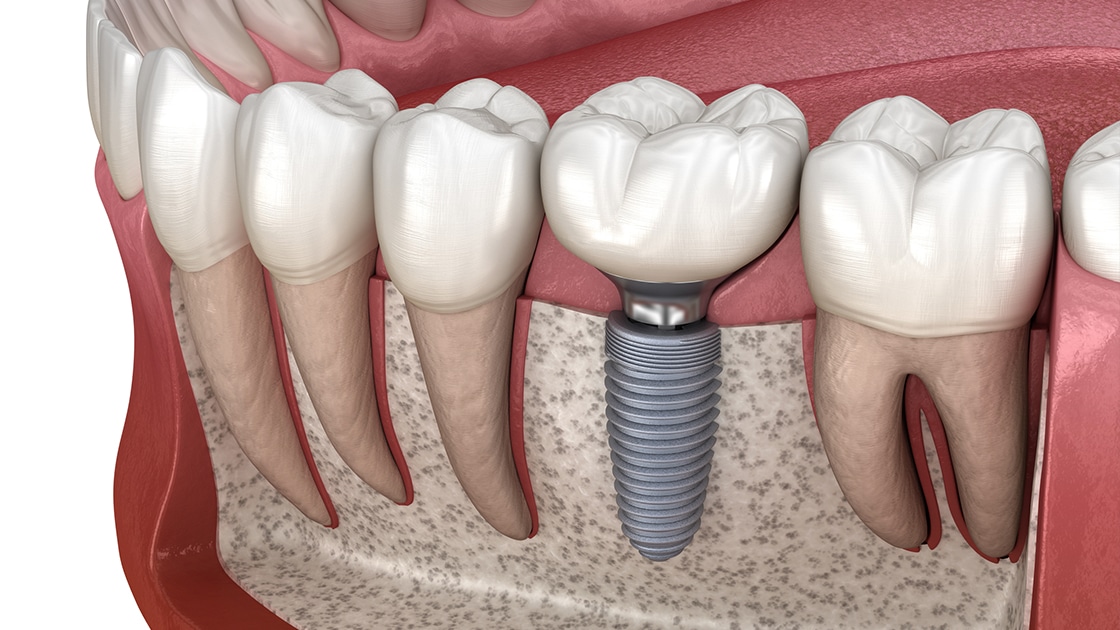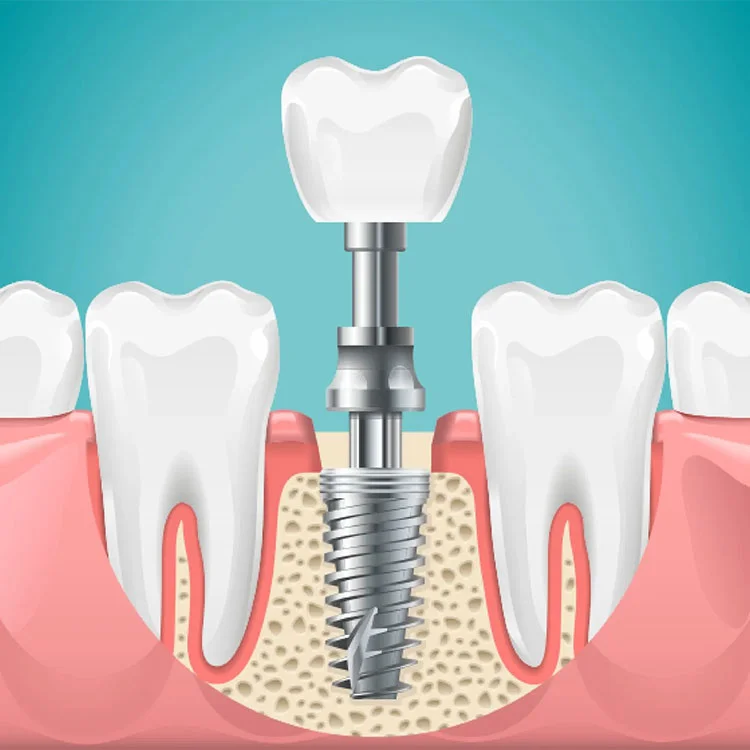Dental Implants | All About Replacing Missing Teeth
Dental implants are one of the most advanced and effective methods for replacing missing teeth. This modern technique not only restores the natural appearance of teeth but also improves their functionality. In this article, based on reliable sources such as the Mayo Clinic, Wikipedia, the FDA, and the Cleveland Clinic, we will explore all aspects of dental implants.

What is a Dental Implant?
A dental implant is a metal screw (usually made of titanium) that acts as an artificial tooth root, placed in the jawbone. This screw fuses with the jawbone and serves as a sturdy base for attaching an artificial tooth crown.
Components of a Dental Implant:
- Fixture: The metal screw inserted into the jawbone.
- Abutment: The part that connects to the fixture and supports the crown.
- Crown: The visible part of the tooth that restores its natural appearance and functionality.

Appointment booking
Advantages of Dental Implants
Dental implants offer several benefits compared to other methods like dentures or bridges:
- Natural and Aesthetic Appearance: The crown on the implant is designed to resemble natural teeth.
- Long-lasting Durability: With proper care, implants can last a lifetime.
- Preservation of Jawbone Health: Implants prevent bone loss in the jaw.
- Ease in Eating and Speaking: Unlike dentures, implants are fixed and do not shift.
- No Damage to Adjacent Teeth: Unlike bridges, there is no need to grind down healthy neighboring teeth.

Who Are Ideal Candidates for Dental Implants?
Dental implants are suitable for most individuals, but certain conditions must be assessed before undergoing this treatment.
Ideal Candidates:
- Individuals who have lost one or more teeth.
- Those with sufficient jawbone density or the ability to undergo bone grafting.
- People who maintain proper oral hygiene.
- Individuals in good overall health.
Unsuitable Candidates:
- Smokers (due to slower bone healing).
- Those with uncontrolled diabetes.
- Individuals who have undergone radiotherapy in the jaw area.
- People with severe gum diseases.
Steps of the Dental Implant Process
Dental implant treatment is a multi-step process that can take several months to complete:
Examination and Planning:
- Initial examination to evaluate oral health.
- Radiography or CT scan to assess jawbone density.
Fixture Placement Surgery:
- A metal screw (fixture) is placed into the jawbone.
- Following this stage, a healing period called osseointegration begins, lasting approximately 3 to 6 months.
Abutment Installation:
- Once the implant has fused with the bone, an abutment is placed on the fixture.
Crown Placement:
- Finally, the artificial crown is attached to the implant.
Types of Dental Implants
Dental implants are categorized based on the patient’s condition and treatment type:
Endosteal Implants:
- The most common type of implant.
- Directly placed into the jawbone.
- Suitable for individuals with sufficient bone density.
Subperiosteal Implants:
- Positioned under the gum and on top of the jawbone.
- Ideal for patients with weak jawbone who prefer not to undergo bone grafting.
Zygomatic Implants:
- Designed for patients with severe jawbone loss.
- Anchored in the cheekbone (zygomatic bone).
Immediate Load Implants:
- Implant and temporary crown are placed immediately after tooth extraction.
- Suitable for individuals with good bone conditions.

Risks and Complications of Dental Implants
Despite its numerous benefits, dental implants may come with certain risks and complications:
- Infection at the Implant Site: Poor oral hygiene can lead to infection.
- Nerve Damage: Incorrect placement of the implant may damage nerves, causing pain or numbness.
- Implant Failure: Rarely, implants may fail due to a lack of integration with the bone.
- Sinus Problems: Implants placed in the upper jaw may affect the sinuses.
Post-Implant Care
To extend the lifespan of dental implants and avoid complications, follow these guidelines:
- Brush and floss regularly.
- Visit the dentist periodically for check-ups and professional cleaning.
- Avoid smoking and tobacco use.
- Refrain from chewing hard objects like ice or hard nuts.
Cost of Dental Implants
The cost of dental implants depends on various factors, including:
- The number of implants needed.
- The material and brand of the implant.
- Whether bone grafting or additional surgeries are required.
- The dentist’s experience and expertise.
For precise pricing, it is best to consult your dentist.
Why Choose Our Clinic for Dental Implants?
At Dr. Mazdak Hashemi’s Clinic, dental implants are performed using the most advanced equipment and the highest-quality materials. Our highly skilled and experienced team guarantees the best results for you. Contact us today for consultation and appointment booking.
For a free consultation and to learn more about the cost of dental implants, call us now or book your appointment online.
📞 +989381556536
📞 +982632802056

